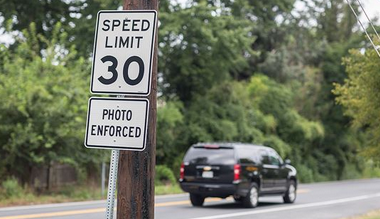Safety advocates are excited about the passage of S.B. 961, a bill that would require all cars sold in California to include a system that warns drivers when they exceed the speed limit by ten miles an hour.
The bill, from Senator Scott Wiener (D-San Francisco), passed the legislature late on Saturday, the last day of the two-year session. It must be signed by Governor Newsom by September 30 before it becomes law.
Advocates say this bill is a necessary step towards reducing vehicle speeds to make streets safer. Streets Are For Everyone (SAFE), one of the bill's sponsors, published a report last year on the steep rise in traffic fatalities in Los Angeles, and found that in almost forty percent of collisions, speed was a major factor.
What makes this bill notable is that California would be the first state to require vehicles to include what's called "passive intelligent speed assistance" or passive ISA. If the governor signs the bill, it would apply to all new passenger vehicles, trucks, and buses sold or leased in California starting in 2030. The size of California's auto market would make it very likely that vehicle manufacturers would include it in autos sold throughout the entire country.
ISA technology has been required on European vehicles since 2022. It has been tested in various forms over several decades, including passive as well as more active systems that prevent a vehicle from speeding rather than just warn the driver. Research shows that both passive and active ISA lead to speed reductions as well as reduced variations in speed, and to less time spent exceeding the speed limit.
The National Traffic Safety Board (NTSB) has called for speed limit technology to be included in all new cars. The National Highway Safety Traffic Administration (NHSTA) is working on two studies to assess the technologies' limitations, capabilities, and effectiveness, as well as consumer acceptance.
Many car models sold in the U.S. already include an ISA system. Some use GPS to determine location and thus the local speed limit; some use cameras that can read speed-limit signs. Both technologies have some limitations in terms of accuracy, related to mapping quality and visibility. The system required by S.B. 961 would provide only "a brief one-time signal to alert a driver each time they exceed the speed limit by more than ten miles per hour," according to the legislation.
"How to turn off speed limit assist" is a common Google search term, showing that some drivers prefer not be bothered even by a single alert. At the same time, the cars that offer ISA are marketed as "vehicles that can help you avoid tickets." And a recent survey showed that most drivers would not mind having their car warn them when they exceed the speed limit.
S.B. 961 does not solve speeding, especially if it can be turned off. Street design and active, not passive, speed limiters would be more effective at changing the culture of speeding that is putting the lives of pedestrians, bike riders, and other drivers at risk. But one must begin somewhere.






